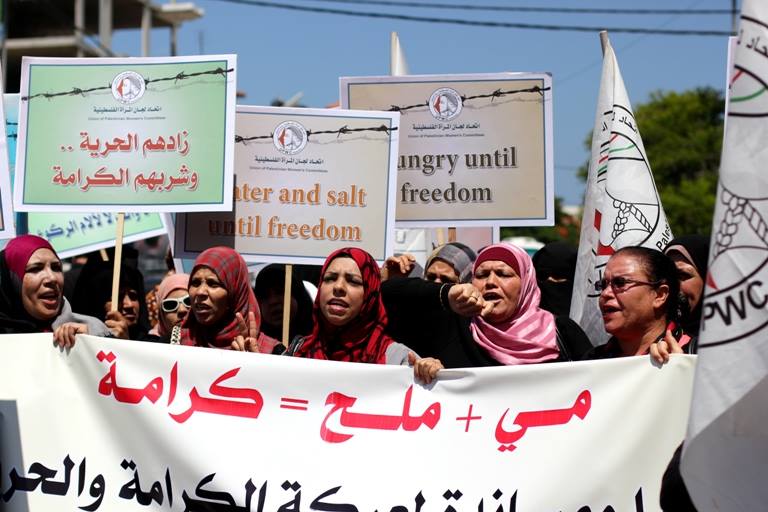
“On this day, we affirm that we are Palestinian prisoners of struggle, and part of the Palestinian women’s movement, and that the national and social struggle goes on constantly and continuously until we win our freedom from occupation, and our freedom as women from all forms of injustice, oppression, violence and discrimination against women….We stand as part of a global struggle with all the world’s women freedom fighters: against injustice, exploitation and oppression.” – Khalida Jarrar
Palestinian women have always been a part of the struggle for national liberation: in the streets and fields of Palestine, in the home, the school, the university; in all forms of struggle, from the cultivation of Palestinian agriculture and the education of Palestinian children, to engagement in political leadership and all forms of struggle and resistance.
Accordingly, they have faced political imprisonment, torture and repression. Since 1967, over 15,000 Palestinian women have been arrested and imprisoned in Israeli jails; since 2000, 1,400 Palestinian women have been arrested and imprisoned. 3,000 women were imprisoned during the Palestinian intifada of 1987-1992.
Currently, there are approximately 60 Palestinian women held in Israeli jails. 118 Palestinian women have been detained since October 2015 and the rise of the Palestinian popular uprising. 10 Palestinian girls under 18 are imprisoned, and 3 of the Palestinian women imprisoned are held under administrative detention without charge or trial. The imprisonment of Palestinian women has risen dramatically alongside the mass incarceration of Palestinian men. Addameer notes that the current imprisonment of Palestinian women marks a 70% increase over 2013, and a 60% increase over 2014.
[quote_box_center]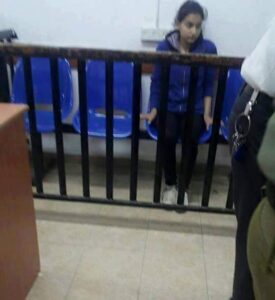 DIMA AL-WAWI: Dima Al-Wawi is 12 years old, the youngest Palestinian prisoner in Israeli jails, sentenced to 4.5 months in prison and an 8,000 NIS fine for simply carrying a knife near the settlement of Karmei Tzur, near her school. She had never interacted with the Israeli occupation forces before and was deeply upset by the ongoing imprisonment of Mohammed al-Qeeq, the hunger-striking Palestinian journalist. Telesur reports, “The girl’s plea bargain during the trial was transcribed…’I am in the seventh grade. I go to Shahada School. I understand that my defense counsel reached an agreement according to which I will have to serve a prison term of four and a half months. I understand that my parents will pay a fine of 8,000 shekels. In my school we learn arithmetic, English, Arabic and religious studies.’… Dima’s father lost his job as a construction worker in Israel after the event, but they will still have to pay the US$2,000 fine. “[/quote_box_center]
DIMA AL-WAWI: Dima Al-Wawi is 12 years old, the youngest Palestinian prisoner in Israeli jails, sentenced to 4.5 months in prison and an 8,000 NIS fine for simply carrying a knife near the settlement of Karmei Tzur, near her school. She had never interacted with the Israeli occupation forces before and was deeply upset by the ongoing imprisonment of Mohammed al-Qeeq, the hunger-striking Palestinian journalist. Telesur reports, “The girl’s plea bargain during the trial was transcribed…’I am in the seventh grade. I go to Shahada School. I understand that my defense counsel reached an agreement according to which I will have to serve a prison term of four and a half months. I understand that my parents will pay a fine of 8,000 shekels. In my school we learn arithmetic, English, Arabic and religious studies.’… Dima’s father lost his job as a construction worker in Israel after the event, but they will still have to pay the US$2,000 fine. “[/quote_box_center]
Indeed, as International Women’s Day dawns in 2016, Palestinian grassroots activist Manal Tamimi, well-known for her leadership in the popular protests in Nabi Saleh against settlement expansion and confiscation of Palestinian land from the small agricultural village outside Ramallah, who has represented the Palestinian struggle around the world, was seized by Israeli occupation soldiers in a violent 1:00 am raid on her home in the village, thrown into a military jeep and taken to an unknown location. On 7 March, Palestinian advocate Shireen Issawi was sentenced to four years in Israeli prisons by a military court for her role in supporting Palestinian political prisoners. Palestinian parliamentarian and feminist leader, Khalida Jarrar, is serving a 15-month sentence for her own advocacy for freedom for Palestinian prisoners and for Palestine. They are among 60 more Palestinian women imprisoned for their role in struggling for the freedom of their people
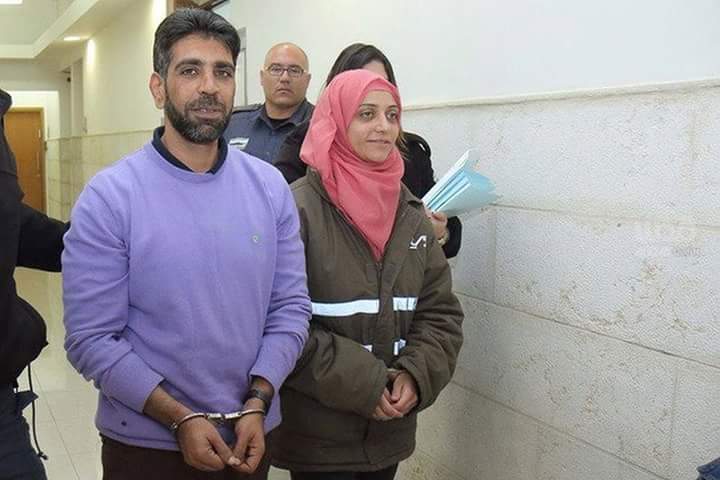
[quote_box_center]SHIREEN ISSAWI: Palestinian lawyer and advocate Shireen Issawi became known to the world as the spokesperson for her brother, Samer Issawi, during the over 200-day hunger strike that led to his freedom. (Samer is now re-imprisoned again by the Israeli occupation.) She and her brother Medhat ran a Palestinian legal services office that connected Palestinian prisoners to Israeli lawyers and to their family members, often denied visits. The recipient of support from international human rights organizations and the winner of the Alkarama award for human rights, Issawi was sentenced on 7 March to 4 years imprisonment for her work with Palestinian prisoners.[/quote_box_center]
The rise in “house arrest” orders in Jerusalem have led to a new form of Palestinian prisoner: Palestinian women imprisoned with their sons inside their homes in Jerusalem. In a particularly dangerous precedent not only for children but for Palestinian women, an order of house arrest was made against the child Milad Musa Salah-al-Din, 16, of Hizma in Jerusalem, on the condition that his mother be imprisoned with him for two months. Both are threatened with a 20,000 NIS fine if either of them leaves the home. This comes after he was imprisoned for 25 days, accused of throwing stones, and his family paid a fine of 10,000 NIS. His mother is prohibited from teaching at her job as a school teacher.
Most Palestinian women prisoners are held in two prisons, HaSharon and Damon. Like Palestinian men, Palestinian women are arrested in multiple venues: on the streets, at Israeli checkpoints, when going to pray at Al-Aqsa mosque, and in late-night raids on their homes. Several Palestinian women have been arrested when visiting their imprisoned sons or other relatives. They are taken to detention and interrogation centers where they can spend weeks or months under interrogation without charge, trial, or access to a lawyer. Palestinian women have reported the use of stress positions, sexual harassment and threats of sexual assault, sleep deprivation and other forms of cruel, arbitrary strip searching, inhuman and degrading treatment amounting to torture under interrogation. As Palestinian writer Reham Alhelsi notes, “Palestinian female prisoners are subjected to various forms of psychological torture; including verbal harassment, insulting religious and national beliefs of the prisoners, uttering obscenities in front of them during the investigation, threats of sexual assault and rape to force Palestinian women to surrender and submit confessions. Additionally, Palestinian female political prisoners, like their male comrades, are held under inhumane conditions in cells that are overcrowded, dirty, humid, cold in winter and hot in summer, and lack ventilation and the basic needs for living. They also suffer from various punishments, ranging from malnutrition, medical negligence, to denial of family visits and isolation.”
[quote_box_center] KHALIDA JARRAR: Palestinian parliamentarian, advocate for Palestinian prisoners, leftist and feminist, Jarrar faced down an attempt to forcibly displace her from her home in Ramallah to Jericho by an Israeli military order. Her month-long sit-in at the Palestinian Legislative Council office won international support and attention for the struggle of the former executive director of Addameer Prisoner Support and Human Rights Association. Several months after defeating the displacement attempt, she was arrested in a violent dawn raid by Israeli occupation forces, who invaded her home. She was originally ordered to administrative detention; following an international outcry, she was then charged in the military courts with 12 charges relating to public speaking, advocacy and media interviews, especially in support of Palestinian prisoners. She is now serving a 15-month sentence in HaSharon prison.[/quote_box_center]
KHALIDA JARRAR: Palestinian parliamentarian, advocate for Palestinian prisoners, leftist and feminist, Jarrar faced down an attempt to forcibly displace her from her home in Ramallah to Jericho by an Israeli military order. Her month-long sit-in at the Palestinian Legislative Council office won international support and attention for the struggle of the former executive director of Addameer Prisoner Support and Human Rights Association. Several months after defeating the displacement attempt, she was arrested in a violent dawn raid by Israeli occupation forces, who invaded her home. She was originally ordered to administrative detention; following an international outcry, she was then charged in the military courts with 12 charges relating to public speaking, advocacy and media interviews, especially in support of Palestinian prisoners. She is now serving a 15-month sentence in HaSharon prison.[/quote_box_center]
Palestinian women prisoners are also subject to denial of medical care, especially for those injured by Israeli occupation soldiers. Most of the minor girls imprisoned in HaSharon were injured or shot, and were transferred to prison before the completion of their recovery. They are regularly transferred back to hospital due to the ongoing complications of their injuries, yet are regularly exposed to threats of infection or further injury in prison. Shorouq Dwayyat, who was shot by an Israeli settler after she resisted his harassment in Jerusalem, was denied medical care after being shot, and was transferred to HaSharon prison while relying on a wheelchair, the use of which was regularly denied. Israa Djaabis, suffering from second and third degree burns, and Abla al-Aedam, shot in the head by soldiers, were both moved to HaSharon prison despite their ongoing and serious injuries requiring regular assistance by their fellow prisoners.
[quote_box_center]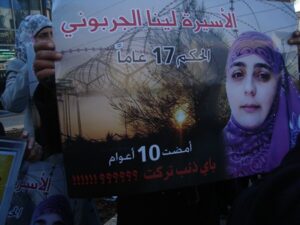 LENA JARBOUNI: The longest-serving Palestinian woman prisoner, Jarbouni, from Akka, is a Palestinian citizen of Israel who worked in sewing workshops and was arrested in 2002. She is ill and suffers from a number of diseases. Lina is the spokesperson and representative of women prisoners in HaSharon; sentenced to 17 years, she has three years remaining in her sentence. She received this lengthy sentence for “aiding the enemy” – Palestinian resistance. She was denied essential medical treatment until her fellow women prisoners launched a strike for her treatment. She teaches her fellow women prisoners Hebrew and has played a critical role in advocating for the educational rights of imprisoned Palestinian girls.[/quote_box_center]
LENA JARBOUNI: The longest-serving Palestinian woman prisoner, Jarbouni, from Akka, is a Palestinian citizen of Israel who worked in sewing workshops and was arrested in 2002. She is ill and suffers from a number of diseases. Lina is the spokesperson and representative of women prisoners in HaSharon; sentenced to 17 years, she has three years remaining in her sentence. She received this lengthy sentence for “aiding the enemy” – Palestinian resistance. She was denied essential medical treatment until her fellow women prisoners launched a strike for her treatment. She teaches her fellow women prisoners Hebrew and has played a critical role in advocating for the educational rights of imprisoned Palestinian girls.[/quote_box_center]
For Palestinian girls, imprisonment also threatens their education. WOFPP reported that “the prisoners’ spokesperson in Hasharon, Lena Jarbouni demanded that the prison authorities provide regular schooling for all minor prisoners. Most of them are school students and some are in their final year and have to prepare for their Tawjihi (final) exams. Recently, the prison authorities responded positively and agreed to provide a special prison-appointed teacher, following which twice-weekly day studies have begun.” Palestinian women within the prisons have both struggled for girls’ right to education and provided direct support despite all attempts to deny or undermine education for girls. Khalida Jarrar and Mona Qa’adan supervised the 2015 Tawjihi exams within the prisons, ensuring that several girls could receive their graduation certificates.
The denial of education also impacts university students. For example, the graduation of Asmaa Qadah – the secretary of Bir Zeit University’s student union – has been postponed due to her being held in administrative detention for three months.
[quote_box_center]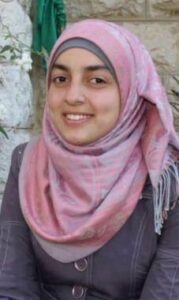 ASMAA QADAH: Asmaa Qadah, 21, is a student at Bir Zeit University, who was arrested in December 2015 as she crossed Zaatara checkpoint heading toward the university from her home in Nablus. The secretary of Bir Zeit’s student union, Asmaa is affiliated with the Islamic Bloc, one of the student blocs that participates in the union. She was ordered to three months in administrative detention without charge or trial on the basis of so-called secret evidence. She was interrogated for only one hour, and the Israeli state’s public expressions against her related entirely to her participation in student elections at Bir Zeit University. An English language major, Asmaa was scheduled to graduate in 2016 with high honors. Due to her detention, her graduation has been postponed. She has been denied family visits. One day after her arrest, her father was also imprisoned and accused of affiliation with a “prohibited organization.” All major Palestinian political parties are prohibited by the Israeli military occupation by military order.[/quote_box_center]
ASMAA QADAH: Asmaa Qadah, 21, is a student at Bir Zeit University, who was arrested in December 2015 as she crossed Zaatara checkpoint heading toward the university from her home in Nablus. The secretary of Bir Zeit’s student union, Asmaa is affiliated with the Islamic Bloc, one of the student blocs that participates in the union. She was ordered to three months in administrative detention without charge or trial on the basis of so-called secret evidence. She was interrogated for only one hour, and the Israeli state’s public expressions against her related entirely to her participation in student elections at Bir Zeit University. An English language major, Asmaa was scheduled to graduate in 2016 with high honors. Due to her detention, her graduation has been postponed. She has been denied family visits. One day after her arrest, her father was also imprisoned and accused of affiliation with a “prohibited organization.” All major Palestinian political parties are prohibited by the Israeli military occupation by military order.[/quote_box_center]
Palestinian women outside Palestine are also subject to political imprisonment and repression at the hands of the Israeli state and allied governments – the case of Rasmea Odeh is an instructive and iconic example. Odeh, 67, is a former Palestinian prisoner who served 10 years in Israeli prison after being subject to horrific torture, including rape and sexual assault. For the past four years she has faced imprisonment and deportation at the hands of the United States government, which has persecuted her for alleged immigration violations based on her experience as a Palestinian political prisoner in Israeli jails. Odeh, who in Chicago has led in the organizing of Palestinian and Arab women, has been the subject of a strong solidarity and defense campaign, and she and her legal team recently won an important victory in appeals court. However, her persecution is part and parcel of the same system that imprisons Palestinian women in Palestine in an attempt to undermine Palestinian organizing and struggle for freedom.
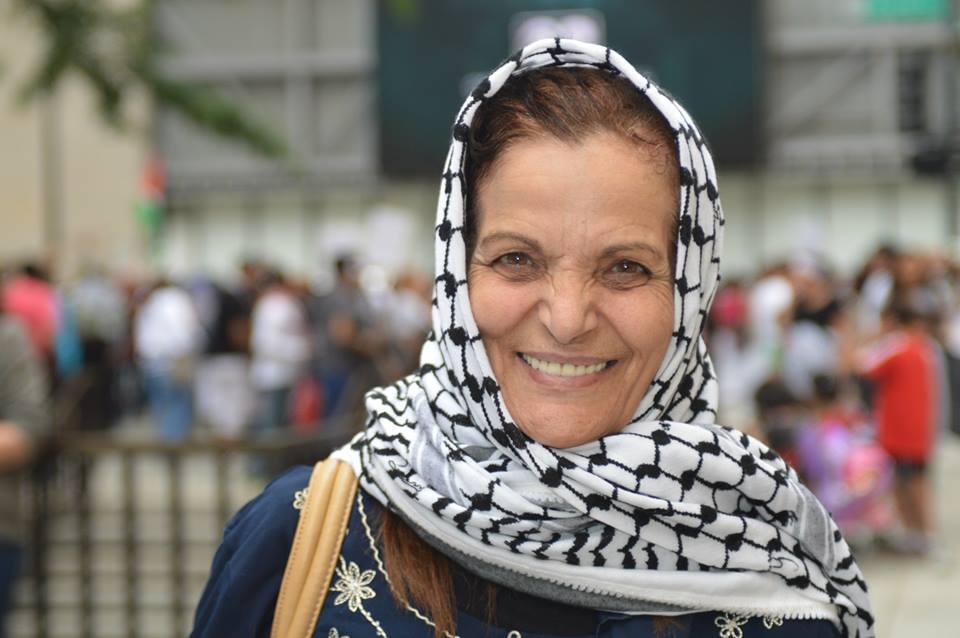
[quote_box_center]RASMEA ODEH: Rasmea, 67, was imprisoned from 1969 to 1979 in Israeli prisons, from the age of 22. A student, she was part of a politically active family; she was arrested and interrogated, subjected to horrific torture, rape and sexual assault. Her case has been known around the world since the 1970s, when the torture she suffered was exposed by a British newspaper and brought before the United Nations. After years of organizing in Chicago with the Arab American Action Network, as a leader in the Palestinian and Arab community in the city, she was once again faced with arrest, imprisonment and deportation, this time at the hands of the United States government, on the basis of alleged immigration violations. She has been consistently denied the right to speak about her experience as a survivor of torture in court, a fact that recently won her an important victory in appeals court. She has a strong solidarity campaign and continues to be involved in movements against police brutality, racism and oppression in Chicago and the United States, supporting Palestinian youth organizing.[/quote_box_center]
The transfer and transportation of Palestinian prisoners serves as another form of abuse for Palestinian women. Many Palestinian prisoners have written about the “Bosta,” the metal transport vehicle in which prisoners are shackled and transported for long hours. Leena Jawabreh, former Palestinian prisoner, wrote, “She is transferred in the ‘Bosta,’ the designated vehicle to transfer prisoners to the military courts. It is in fact a mobile cell with a metal chair. It can barely accommodate one person in a sitting position, and the windows are blacked out. The prisoner is chained by her hands and feet, and the shackles hurt her wrists every time she moves and leave marks on her body. The Bosta is used without any mercy from the occupation. She is subjected to all kinds of humiliation, verbal abuse, and mockery by the soldiers who transport her.”
WOFPP reports that Palestinian women held in Damon prison are subject to constant transfers by ‘Bosta’ whenever a hearing is scheduled in their cases before the military courts. They are first transferred to HaSharon and then to the military court, with the same procedure upon their return. At times, they are held at HaSharon for an entire weekend if their hearing takes place on a Thursday or Sunday, preventing them from any stability. “This means that they are deprived of any kind of routine, and this together with the difficult transportation conditions and the move from prison to prison lead many of the women to want to give up attending their own trials – something about which they do not always have a choice.”
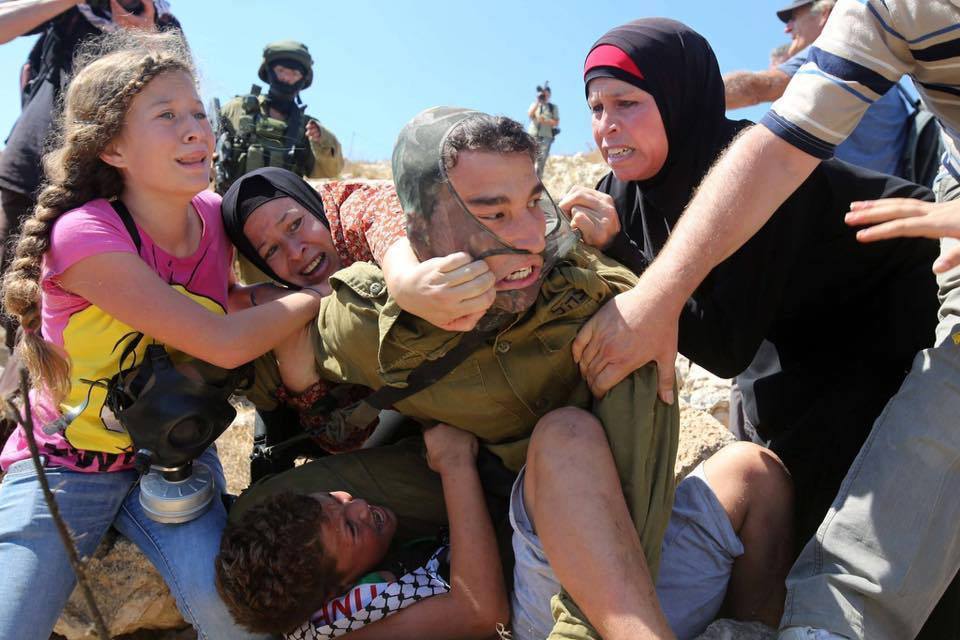
[quote_box_center]MANAL TAMIMI: Internationally renowned for her leadership in the grassroots, popular struggle in the small agricultural village of Nabi Saleh, threatened by the expansion and land confiscation of the illegal Halamish settlement against their community. She is a leader in the weekly Friday protests that challenge the settlements and the military occupation, demanding freedom from land confiscation. Tamimi has spoken around the world about the struggle in Palestine and in Nabi Saleh; the image of her and her daughters defending her son from an Israeli soldier became famous around the world as a representation of Palestinian women’s resistance. At 1:00 am on International Women’s Day, 8 March, Tamimi’s home was invaded by armed occupation soldiers, who seized her and took her to an unknown destination.[/quote_box_center]
Palestinian women prisoners are also subject to solitary confinement and isolation, and denied family visits, including with their children, under “security” pretexts and as “punishment” for acts of protest and resistance inside the prison. Six Palestinian women were denied family visits for one month for raising the Palestinian flag in 2015 on “Israeli independence day.” The isolation and division of Palestinian families because of Israeli mass imprisonment is not only experienced by women inside the prisons, but by Palestinian women outside the prisons. 40% of Palestinian men in the West Bank will be imprisoned or detained by Israeli occupation forces at some point in their lives. Palestinian women are denied access to their fathers, sons and husbands, deprived of the income and family support and sustenance of male partners, and forced to act as single mothers because of the ongoing mass imprisonment of Palestinian men.
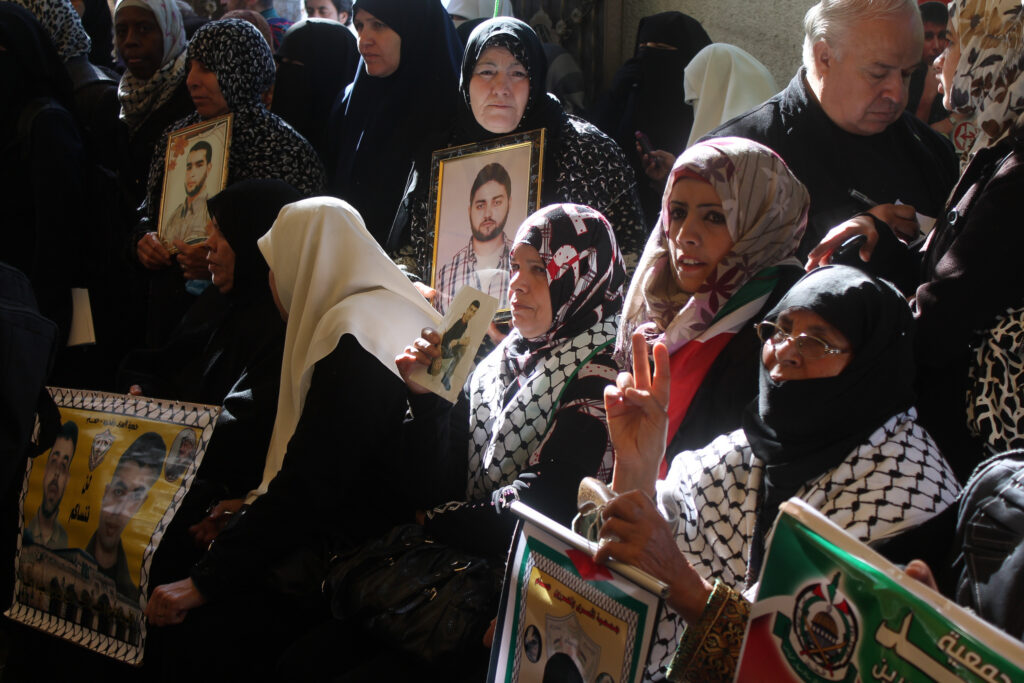
Palestinian women have also been leaders in resistance inside the prisons, participating in hunger strikes, raising the Palestinian flag, and continuing the education of imprisoned girls. At the same time, Palestinian women are foremost leaders of the movement to support and free the over 7,000 Palestinian prisoners inside Israeli jails outside the prisons as well. It is the mothers, wives and sisters of the prisoners that organize vigils, protests, strikes and demonstrations demanding the freedom of all Palestinian prisoners.
On International Women’s Day 2016, Samidoun Palestinian Prisoner Solidarity Network salutes Palestinian women inside the Israeli prisons, struggling for freedom for themselves, for Palestinian women and for the Palestinian people. Mass imprisonment is a fundamental weapon of settler colonialism, in this case of Zionism, as a method of attempting to suppress indigenous resistance and freedom struggle. From Khalida Jarrar, to Asmaa Qadah, to Shireen Issawi, to Lina Khattab, Palestinian women inside and outside prison are on the front lines of Palestinian resistance and Palestinian liberation.
In order to struggle for the release of all Palestinian women prisoners – and indeed, of all Palestinian prisoners – from Israeli jails, we urge:
- International accountability for the Israeli state. The Israeli occupation’s arrest, torture and mistreatment of Palestinian women prisoners violate numerous international treaties and conventions, including the Fourth Geneva Convention, the International Convention on Civil and Political Rights, the Convention against Torture, and the Convention on the Elimination of all Forms of Discrimination against Women. The United Nations, United States and European Union must hold Israel accountable, including by ending all US aid to Israel, ending the EU/Israel Association Agreement, and ending Israeli participation in European-funded programs for research and development.
- Escalating the boycott of G4S. G4S, a British-Danish security conglomerate, provides security systems, control rooms and equipments for the Israeli prisons, interrogation centers and checkpoints where Palestinian women prisoners are held, including HaSharon and Damon prisons. At HaSharon, G4S provides the main control room for the prison. Palestinian prisoners have urged the boycott of G4S and there is an international campaign to demand agencies – especially public bodies – stop doing business with this human rights abusing corporation. Just this past week, UNICEF in Jordan cancelled its contracts with G4S. Universities, public institutions and the UN all contract with G4S – those contracts must come to an end.
- Building the boycott, divestment and sanctions movement. The international campaign for BDS is building the international isolation on the Israeli state due to its abuse and violations against the Palestinian people and Palestinian prisoners. This powerful popular initiative is critical to building international support for the Palestinian people’s struggle for liberation – liberation of the prisoners and liberation of Palestine.
- Escalating the popular movement in solidarity with Palestinian prisoners. Inside the prisons, Palestinian women and men are striking, organizing and struggling, leading the movement for the freedom of the Palestinian people. The Palestine solidarity movement outside prison must emphasize the stories of Palestinian prisoners, the struggle of Palestinian prisoners, and raise their cases in all international forums and events. The women’s movement globally has a significant role to play in building this popular movement with Palestinian women prisoners in particular, and supporting the Palestinian popular feminism that challenges and resists occupation, oppression, apartheid, imperialism and Zionism – the forces killing and imprisoning Palestinian women.
“We, women Palestinian prisoners, call on the people of the world to support our struggle, to demand our rights and our freedom. We demand to be treated as prisoners of war with our rights fully recognized under the Geneva Conventions. We know that we are prisoners of freedom, because we are committed to the freedom of our Palestinian land and people. The Palestinian, Arab and international voices calling for our rights and our freedom break through the darkness of the interrogation cells, the cruelty of soldiers and guards, and the injustice of the prison. We call upon you to make our case, the case of the Palestinian prisoners, an international imperative for justice and freedom.” – Leena Jawabreh
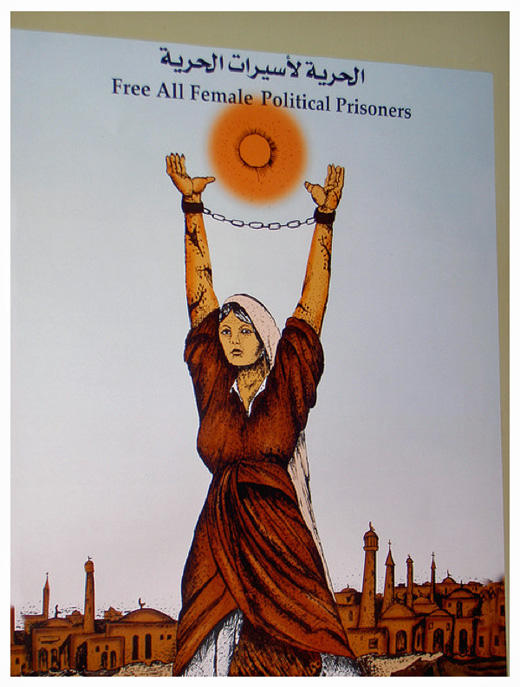
Resources:
Nahla Abdo, From Captive Revolution to Grand Gaza Prison: https://plutopress.wordpress.com/2014/08/21/from-captive-revolution-to-grand-gaza-prison/
(Also see Abdo’s book, Captive Revolution: https://www.plutobooks.com/display.asp?K=9780745334936&%3C/)
Reham Alhelsi, The Women of Palestine and the Struggle for Liberation: https://avoicefrompalestine.wordpress.com/2012/03/10/the-women-of-palestine-and-the-struggle-for-liberation/
Reham Alhelsi, Palestinian Female Political Prisoners and Detainees: Ongoing Resistance Behind Zionist Bars, https://avoicefrompalestine.wordpress.com/2015/12/28/palestinian-female-political-prisoners-and-detainees-ongoing-resistance-behind-zionist-bars/
Reham Alhelsi, Palestinian Female Political Prisoners and Detainees: Resistance and Steadfastness towards the Liberation of Palestine: https://avoicefrompalestine.wordpress.com/2015/11/30/palestinian-female-political-prisoners-and-detainees-resistance-and-steadfastness-towards-the-liberation-of-palestine/
Addameer, Occupied Lives: The Imprisonment of Palestinian Women and Girls: http://www.addameer.org/publications/occupied-lives-imprisonment-palestinian-women-and-girls
Leena Jawabreh, Facing imprisonment in Israeli Jails: A Palestinian Woman’s Testimony: https://samidoun.net/2013/09/facing-imprisonment-in-israeli-jails-a-palestinian-womans-testimony-by-leena-jawabreh/
International Women’s Day: Khalida Jarrar’s statement from HaSharon prison: https://samidoun.net/2016/03/international-womens-day-khalida-jarrars-statement-from-hasharon-prison/
Film, Women in Struggle, Dir: Buthaina Canaan Khoury, 2004: https://www.youtube.com/watch?v=v0Va7-cNxf8
Film, Tell Your Tale, Little Bird, Dir: Arab Loutfi, 2007: https://www.youtube.com/watch?v=wdkoxBjKM1Q
The Struggle of Palestinian Women (PLO, 1975): http://www.palestinianconference.org/wp-content/uploads/2013/02/PLO-PalestinianWomen.pdf
International Women’s Day and the General Union of Palestinian Women, PFLP Bulletin, April 1982: http://www.palestinianconference.org/wp-content/uploads/2013/03/WomensDay-PFLPBulletin-April1982.pdf
Palestinian Women Develop Their Struggle through Democratic Revolutionary Resolutions, September 1974, PFLP Bulletin: http://www.palestinianconference.org/wp-content/uploads/2013/03/WomensDay-PFLPBulletin-13-SepOct74.pdf
Women’s Struggle in Occupied Palestine, Democratic Palestine, May 1984: http://www.palestinianconference.org/wp-content/uploads/2013/03/WomensStruggle-DemocraticPal-Mar1984.pdf
International Women’s Day Palestinian Poster Collection: http://www.palestineposterproject.org/special-collection/international-womens-day
Institute for Palestine Studies – Special Focus on Palestinian Women: http://www.palestine-studies.org/resources/special-focus/palestinian-women-%E2%80%93-shared-struggle-diverse-experiences
Women’s Organization for Political Prisoners, February 2016: http://www.wofpp.org/english/home.html
Discover more from Samidoun: Palestinian Prisoner Solidarity Network
Subscribe to get the latest posts sent to your email.




